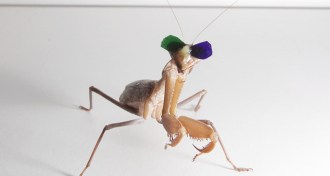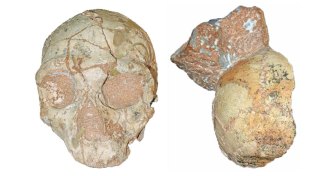Humans
Sign up for our newsletter
We summarize the week's scientific breakthroughs every Thursday.
-
 Health & Medicine
Health & MedicineBotox may relieve persistent pelvic pain caused by endometriosis
The wrinkle-smoothing treatment Botox may relieve pain from muscle spasms in the pelvic floor of women with endometriosis.
-
 Science & Society
Science & SocietyLonger gaps between births can halve infant deaths in developing nations
Leaving more time between successive pregnancies matters for infant survival, but only in less-developed countries.
By Sujata Gupta -
 Health & Medicine
Health & MedicineManipulating nerve cells makes mice ‘see’ something that’s not there
Using optogenetics to stimulate about 20 nerve cells causes mice to perceive nonexistent vertical or horizontal lines.
-
 Tech
Tech50 years ago, lambs survived but didn’t thrive inside artificial wombs
Artificial wombs to support preemie babies are closer to reality.
-
 Health & Medicine
Health & MedicineWHO declares a public health emergency over Congo’s Ebola outbreak
The yearlong Ebola outbreak in the Congo has been declared a public health emergency by the World Health Organization.
-
 Health & Medicine
Health & MedicineTiny glasses help reveal how praying mantises can see in 3-D
Newfound nerve cells in praying mantises help detect different views that each of the insects’ eyes sees, a mismatch that creates depth perception.
-
 Anthropology
AnthropologyA Greek skull may belong to the oldest human found outside of Africa
Humans possibly reached southeastern Europe by 210,000 years ago.
By Bruce Bower -
 Health & Medicine
Health & MedicineToddlers tend to opt for the last thing in a set, so craft your questions carefully
Two-year-olds demonstrate a verbal quirk that makes their answers less reliable.
-
 Anthropology
AnthropologyAncient humans used the moon as a calendar in the sky
Whether the moon was a timekeeper for early humans, as first argued during the Apollo missions, is still up for debate.
-
 Health & Medicine
Health & MedicineBreaking down the science behind some of your favorite summer activities
Inject some science into your summer.
-
 Anthropology
AnthropologyAncient DNA reveals the origins of the Philistines
A mysterious Biblical-era population may have fled Bronze Age calamities.
By Bruce Bower -
 Health & Medicine
Health & MedicineRogue immune cells can infiltrate old brains
Killer T cells get into older brains where they may make mischief, a study in mice and postmortem human brain tissue finds.